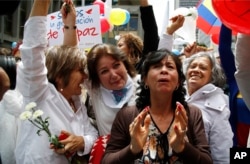The Colombian government and the leftist FARC rebels signed a cease-fire and disarmament deal Thursday, bringing Colombia a major step closer to ending more than 50 years of guerrilla warfare and terrorism
Colombian President Juan Manuel Santos and FARC leader Rodrigo Londono Echeverri signed the agreement in Havana, which has hosted four years of frequently difficult peace talks.
Cuban President Raul Castro and Norwegian Foreign Minister Borge Brende -- whose countries mediated the talks -- watched the events with U.N. Secretary-General Ban Ki-moon, U.S. envoy Bernard Aronson and several other Latin American presidents.
U.S. Secretary of State John Kerry issued a statement, calling the cease-fire "welcome news" for the people of Colombia and everyone who desires peace.
"The United States has supported Colombia in its efforts to strengthen its democracy and safeguard the security of its people. That friendship will continue as Colombia's leaders strive to complete the peace process and take steps to recover from the many years of division and conflict," Kerry said in the statement.
The cease-fire is the last major step before both sides sign a final peace agreement. Santos said he expects that to take place July 20, the day Colombia won independence from Spain in 1810.
Final issues to work out
A few final minor issues need to be worked out before the peace deal is put to the Colombian people in a referendum.
Along with a cease-fire and rebel disarmament, the deal includes land reform and will give former rebels some political power. Ex-FARC fighters can also avoid jail time in exchange for community service and travel restrictions.
Both sides had expected to sign the final agreement in March. But questions remain on exactly how the conditions in the peace deal will be implemented and who will preside over a special war crimes tribunal to consider charges against fighters on both sides.
The most important question is how the deal will be implemented legally and whether it would fall apart if a more conservative government succeeds Santos in 2018.
The Marxist FARC rebels launched their uprising as a poor people's rebellion in 1964 and grew into a dangerous fighting force. It turned to drug trafficking and kidnapping to fund its guerilla war.
But the rebels failed to overthrow a succession of Colombian governments, including some which had U.S. military aid.
The fighting in Colombia has left more than 220,000 people dead.






